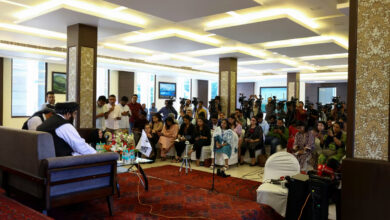Bushra al-Samny, the Muslim Brotherhood female candidate in Alexandria, is confident that she is going to win the woman quota seat in Alexandria in the 28 November parliamentary elections.
"I'm not going to speak about other candidates," al-Samny told Al-Masry Al-Youm. "People in Alexandria know who's Bushra," she said, seated in the official headquarters of the Brotherhood parliamentary bloc in Alexandria, surrounded by banners. Some carried the group's newly adopted slogan, “Together we will change”, while others featured the traditional slogan “Islam is the solution” painted in Islamic calligraphy.
Al-Samny was born in 1960 has been a lifelong supporter of the Muslim Brotherhood. She was a leading female student activist at the University of Alexandria where she did her undergraduates studies in political sciences. Currently a schoolteacher, she is married to Ahmed al-Sokaily, a local leader of the Brotherhood in Alexandria. She has four daughters, three of whom are married to members of the Brotherhood.
"I graduated in 1982. At that time the Brotherhood wasn't very strong. Now, after 30 years, we have succeeded in making the group the most influential political and social force in the city."
After graduation, al-Samny got more involved in the Brotherhood’s activities such as supporting candidates in various elections, doing charity work and mobilizing activists in professional syndicates.
Speaking quietly and maintaining confident eye contact, al-Samny, who tends to quote extensively from the Qur'an, doesn't see any difference between religious and political duties.
"Elections are a religious duty. I was one of the women who were trained to run for election. When the Brotherhood assigned me to run in this race I agreed because it is a religious and national duty for a Muslim woman.”
Experts argue that the Brotherhood has historically taken a conservative stance against women and their perceived roles in society. In their first political party platform draft, issued in September 2007, women and Christians were denied the right to be president. The platform draft celebrates women as wives who bring up their kids in a good Islamic manner.
However, women affiliated with the group have been raising their voices and pressing for more presence in the group’s structural hierarchy.
In 2007, a female activist affiliated with the group criticized its conservative stance in a letter to the Supreme Guide at the time, Mohamed Mahdi Akef. The move was considered the first of its kind since 1928.
Al-Samny argues that men and women are equal in the eyes of the Brotherhood. "People who speak about discrimination against women in the Brotherhood don’t know the movement very well. We are equal and united around building an Islamic society. There is no difference in this context between men and women."
Asked about why there isn't any woman in the higher positions in the group such as in the Guidance Bureau, al-Samny argues, "we (women) will not be safe if we go for posts like that."
"In such political contexts where the group is subject to systematic intimidation, it is agreed that women are better not to be in positions like that."
However, the movement has been increasingly encouraging women's participation, not only in the parliamentary elections but on other matters as well, according to al-Samny.
In the 2000 parliamentary elections, the Brotherhood’s first female candidate Jihan al-Halafawy forced the ruling National Democratic Party (NDP) to cancel the results of the elections in Alexandria's al-Raml district after achieving a big victory against her ruling party rival.
In 2005, another female candidate from the Brotherhood, Makarem al-Deiri, a lecturer in Arabic literature at Al-Azhar University, lost an intensely-followed runoff in Nasr City against NDP tycoon Mustafa al-Sallab.
Al-Samny is following suit. Her campaign is fierce and competitive, but may also spur intimidation from ruling party rivals.
Last week, she was prevented from submitting her candidacy application to the Security Directorate of Alexandria. However, authorities accepted the papers the next day after a protest by her supporters in front of the Directorate.
"I am struggling even before the battle kicks off," al-Samny exclaims.
At the beginning of her campaign, 70 supporters were detained as they started hanging her posters in the streets.
"I know that the restrictions will be huge for any independent candidate and for the Brotherhood in particular," says al-Samny, "But I trust my popularity in the street,” she says, confidently.
Al-Samny will run for a woman quota seat in Alexandria, which brings the total number of Brotherhood candidates in Alexandria to nine, as opposed to eight in the 2005 elections.
Last year, the People's Assembly, the lower house of parliament, passed a law allocating a quota of 64 seats for women. The quota should raise the presence of women in the assembly to more than 12 percent of the seats in an expanded parliament of 518 seats as opposed to 454.
The Muslim Brotherhood, who won a fifth of the seats in the 2005 elections, refused the quota law, claiming it is a maneuver to extend the NDP’s hegemony over the electoral process. "I am running because we need to challenge the NDP and provide an alternative," says al-Samny.
Last year, Minister of Legal and Parliamentary Affairs Moufid Shehab said that the quota law, “ensures parity for women and promotes their role in society, as stipulated by the International Convention on the Elimination of All Forms of Discrimination against Women (CEDAW), which Egypt has signed."
Al-Samny doesn’t subscribe to such a belief. "I'm against this treaty [CEDAW] along with all the international conferences such as the Population Summit since they threaten the unity and customs of the Muslim family."
In 1994, Egypt hosted the International Conference on Population and Development (ICPD), which stirred a controversy for allegedly promoting abortion and pre-martial sexual relations.
"We don't need to import western concepts to address our concerns. By adopting an Islamic approach, we can have a more appealing solutions to address women’s problems."




